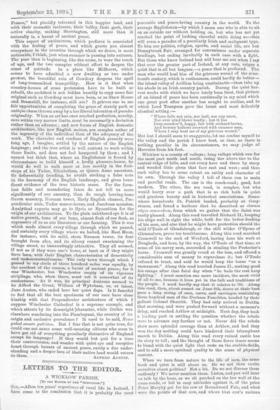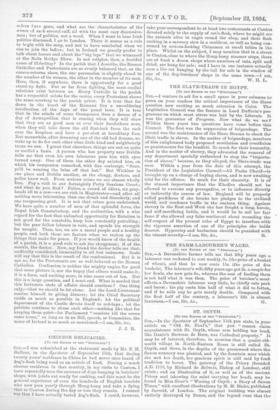LETTERS TO THE EDITOR.
A WICKLOW PARISH.
[TO THE EDITOR or THE ' SPECTATOH."] SIR,—Aften ten years' experience of rural life in Ireland, I have come to the conclusion that it is probably the most peaceable and peace-loving country in the world. To the average Englishman—by which I mean one who is able to sit on an outside oar without holding on, but who has not yet reached the point of looking cheerful while doing so—this will seem a paradox of a peculiarly Irish and malignant type. To him our politics, religion, sports, and social life, are but Donnybrook Fair, arranged for convenience under separate headings, but ending inevitably in each case with a fight. But those who know Ireland best will bear me out when I say that over the greater part of Ireland, at any rate, reigns a.
quiet that is all but languor,—a peace that is profound. The man who would heal him of the grievous wound of the nine- teenth century, which is restlessness, could hardly do better— the island valley of Avillion being unattainable—than take up his abode in an Irish country parish. During the quiet har- vest weeks with which we have lately been blest, that picture of an island of peace has been continually in my mind which one great poet after another has sought to outline, and to which Lord Tennyson gave the latest and most delicately classical setting :- " Where falls not rain, nor hail, nor any snow, Nor ever wind blows loudly ; but it lies Deep-meadow'd, happy, fair with orchard-lawns, And bowery hollows crowned with summer seas, Where I may heal me of my grievous wound."
But lest I should seem to exaggerate, let me confine myself to the valley and the parish I know best, so that, as there is nothing peculiar in its circumstances, we may judge of Hercules from his foot.
Wicklow is a county of valleys ; long valleys which run for the most part north and south, rising tier above tier to the central ridge of hills, and cut every here and there by steep and wooded little glens that face east and west ; and thus each valley has to some extent an entity and character of its own. Through the valley I tell of three run to main and parallel roads. The one is the coach-road; good, but modern. The other, the sea road, is rougher, but who would hurry over a path that is so rich both in quiet and gracious beauty and in historical associations. Some- where hereabouts St. Patrick landed, probably at Grey- stones, and found a harbour that he described as durum, aufqm contmodum, from which we gather that the Saint was easily pleased. Along this road travelled Richard II., keeping his ships well in sight the while, both for the better feeding of his men, and also that he might have protection should the wild O'Toole of Glendalough, or the still wilder O'Byrne of Glenmalure, prove too troublesome. Along this road marched Cromwell to the sack of Wexford, having done his work at Drogheda, and here, by the way, the O'Toole of that time, or some of his merry men, succeeded in stealing the Protector's horse. Cromwell was greatly vexed at the loss, and offered a considerable sum of money to repurchase it; but O'Toole refused to treat, and said he would keep the horse "as a monument." Along this road hurried James IL, making good his escape after that fatal day when " he bade the rest keep fighting." I must mention one more incident, the most vivid of all to me, because it lives yet in the talk and traditions of the people. I need hardly say that it relates to '98. Along this road, then, about sunset on June 8th, drove at their best pace a long string of oars, carts, and carriages, containing three hundred men of the Durham Fencibles, headed by their gallant Colonel Skerritt. They had only arrived in Dublin that morning, and were pushed forward without a moment's delay, and reached Arklow at midnight. Next day, they took a leading part in settling the question whether the rebels were to advance any further or not. Never did the rebels show more splendid courage than at Arklow, and had they won the day nothing could have hindered their triumphant march to Dublin. Along this road every rained castle has its story to tell; and the thought of those fierce times seems to blend with the quiet light that rests on the stubble-fields, and to add a more spiritual quality to the sense of ,physical content.
When we turn from nature to the life of men, the same hush and quiet is still about us. Do we not then excite ourselves about politics? Not a bit. Do we not discuss them endlessly P We never mention them. Listen, and you will hear us talk by the hour, as we sit perched on the low wall at the cross-roads, or loll in easy attitudes against it, of the price Peter Murphy got for his cow at Roundwood Fair, and what were the points of that cow, and where that cow's various eaves I ave gone, and what aro the characteristics of the owner of each several calf, all with the most easy discursive. ness ; but of politics, not a word. When I want to hear Irish politics discussed, I go to London. There it seems as a rule to begin with the soup, and not to have concluded when we rise to join the ladies ; but in Ireland we greatly prefer to talk about horses and about the " big leps " that we witnessed at the Balls Bridge Show. Is not religion, then, a fruitful cause of ill.feeling? In the parish that I describe, the Roman Catholics and Protestants are so evenly balanced that, as the census-returns show, the one persuasion is slightly ahead in the number of its women, the other in the number of its men. Here, then, if anywhere, there is opportunity for a good stand-up fight. But so far from fighting, the most cordial relations exist between us. Every Catholic in the parish has a respectful salute for the rector, every Protestant shows the same courtesy to the parish priest. It is true that far down in the heart of the Romans lies a smouldering recollection of the days of the penal laws. It is true that in the minds of some Orangemen lives a dream of a day of Armageddon that is coming when they will show that they are as good men as ever their forefathers were, when they will take down the old flint-lock from the rack over the fireplace and have a pot-shot at hereditary foes. But meanwhile, after dreaming one of the old bad dreams, we wake up to do for each other what little kind and neighbourly turns we can. I grant that elsewhere things are not on quite so cordial a basis. A parson who has property near Dublin tells me that even his own labourers pass him with eyes turned away. One of them the other day saluted him, on which his companion remarked, with fine contempt, " Sure, ye'll be wearing the brim off that hat," But Wicklow is one place and Dublin another, as the clergy, doctors, and police know well. From serious crime we are almost wholly free. Pay a visit to our fortnightly Petty Sessions Court ; and what do you find P Police, a crowd of idlers, six grey- heads all in a row—we are rich in Magistrates—and after all nothing more interesting than one drunk and disorderly, and one trespassing goat. It is not that crime goes undetected. We have quite a number of men of that splendid force, the Royal Irish Constabulary, and the authorities, with a wise regard for the fact that unlimited opportunity for flirtation is not good for the constable, keep him constantly patrolling ; but the poor fellow labours in vain, and spends his strength for nought. Then, too, we are a moral people and a healthy people, and both these are factors when we reckon up the things that make for peace. If you would know of the health of a parish, it is a good rule to ask the clergyman ; if of the morals, the doctor. Now, my friend the doctor tells me that, medically considered, immorality is all but unknown. Sonie will say that this is the result of the confessional. But it is not so, for the Protestants are as well-behaved as the Roman Catholics. Confession is neither the mighty engine for good that some picture it, nor the bogey that others would make it; it is a form, and nothing more, in nine cases out of ten. But this is a large question, and I must end. What is needed that this fortunate state of affairs should continue P One thing only,—that we should be let alone. Let the Lord-Lieutenant confine himself to giving dinners ; let the Chief Secretary reside as much as possible in England ; let the political department of the Castle devote itself to red-tape ; let the patriots continue to abuse each other—nothing like that for keeping them quiet—let Parliament " resolute till the crows come home," so long as in no Bill, speech, or Committee, the name of Ireland is so much as mentioned.—I am, Sir, &c., J. J. R.



































 Previous page
Previous page